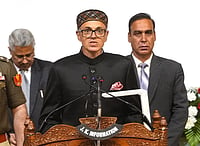What are the prospects of peace overtures taken by the leadership of the two countries to bringnormalisation in the Indo-Pak relations?
'People Of India Desire Nothing But Peace With Pakistan'
The External Affairs Minister in his first interview to a Pakistani media organisation, Associated Press of Pakistan, 26 May, 2003.

Yashwant Sinha: I am happy to have this opportunity to speak to the people of Pakistan through APP. This is the firstinterview I am granting to a Pakistani media organization. Therefore, let me begin by assuring you that peopleof India desire nothing but peace with Pakistan. We would like to resolve all outstanding issues between usand to work together towards a better future and towards common prosperity. We would like to be positive andoptimistic about the prospects for peace in the region.
Our Prime Minister has taken a significant statesmanlike initiative by extending once again the hand offriendship to Pakistan during the public rally in Srinagar on April 18. Our Prime Minister’s initiative hada tremendous resonance both in India and Pakistan, and internationally. If there is one central message toPakistan contained in PM’s speech in Srinagar, it is that India will not be found wanting when it comes toefforts for peace.
Prime Minister Jamali’s telephone call of April 28 continued this process. The telephone conversationbetween the two Prime Ministers and exchange of letters have further created some understanding of the basisfor moving ahead.
We had announced two specific steps. Following this, our new High Commissioner to Islamabad has alreadybeen appointed. This is only a reflection of the seriousness with which we are pursuing the new initiative.
We are also ready to restore civil aviation links on a reciprocal basis. This will, inter alia, enableresumption of direct travel between the two countries, which the ordinary citizens can avail of.
In fact, we have a clear road map and approach in our minds to normalize our relations in a step-by-stepprocess, and to resume the dialogue process in a calibrated and a well prepared manner. We are ready to takethese further steps. Some reported recent actions by the Pakistan authorities, for instance against some ofthe Hizbul Mujahideen elements, have been positive, even though still incomplete.
Therefore, I do believe that there are indications and good grounds for successful realization of the goalsset by our Prime Minister’s recent peace initiative.
At the same time, we must all have no doubts about the fact that the prospects depend critically on thesteps that Pakistan takes to end its sponsorship and support to cross border infiltration and terrorism, andto dismantle the infrastructure of terrorism. Otherwise, the atmosphere can be vitiated and the attemptsderailed at any stage.
Is resumption of air, road and rail links between the two countries possible in the near future?
Most certainly. We have already announced our willingness to restore civil aviation links on a reciprocalbasis. As I mentioned earlier, we are ready to take further steps. It would be natural to restore road andrail links as we proceed further on the normalisation path.[This interview was conducted before theannouncement of resumption of Lahore Bus -- Ed] This would naturally depend on the successfulimplementation of the measures announced so far, and the steps that Pakistan takes to end cross borderinfiltration and terrorism.
Let me clarify that the step-by-step approach which we advocate is not to slow down the process but toensure that we are sure footed and make no mistakes while moving forward. There should be no cause forretraction later.
Do you think that the slow pace of peace process will be able to realize the objectives of overallinitiatives?
We all want the initiative to achieve its objectives. Our goal is peace and the establishment of a durablefriendship. What is important therefore is not the pace of progress but that there is sincerity to this goal.Past experience clearly suggests that one must proceed in a step by step, calibrated and well prepared manner.
Will you please specify the time frame for the commencement of formal talks between India and Pakistan?
We have always been ready for talks with Pakistan. The timeframe cannot be set by only one side.
Are you satisfied with the pace of peace process?
Haste does not always make for speed. One has to understand and recognize the significance of theinitiative of our Prime Minister which has set the ball rolling once again. It is important to ensure that theefforts are sustained on a firm foundation. The community supportive of peace and cooperation between the twocountries has once again become active. You would have seen the warmth of the reception accorded to thePakistani parliamentarians who had recently come to India in response to a private initiative. Our PrimeMinister in his telephone conversation with Prime Minister Jamali had emphasized the importance ofpeople-to-people contact for creating a climate conducive to normalization. In the background of the historyof mistrust and strained relations between our two countries, it is perhaps more productive to proceed slowly,creating a climate conducive to addressing differences, and without raising expectations that cannot be metimmediately. It is important to ensure that the efforts are sustained on a firm foundation.
Would India like to pick the thread from inconclusive Agra summit for formal talks?
We would like to pick up all the old threads starting with Simla.
What is the impact of US Deputy Secretary of State Mr. Richard Armitage's visit to Pakistan and India oncurrent developments?
Richard Armitage visited India on 10th May and I met Colin Powell in Moscow four days later. In ourinteractions, the U.S. leaders have articulated their admiration for prime Minister’s initiative andstatesmanship.
The U.S. leadership has expressed the hope that step-by-step progress would eventually lead to a resolutionof all issues between India and Pakistan through bilateral dialogue. We expect the international community,including the United States, to continue to exert pressure on Pakistan to end cross-border terrorism in thecontext of the global war against terrorism and Pakistan’s commitment to end terrorism directed againstIndia. The curbing of infiltration must be supplemented by dismantling the infrastructure of terrorism. Thatalone can build a conducive atmosphere for the proposed dialogue.
How do you view the package of Confidence Building Measures, offered by Pakistan in response to hand offriendship extended by H.E. Prime Minister Atal Behari Vajpayee?
We have welcomed several of the measures, including upgradation of representation in the respective HighCommissions, and release of some Indian prisoners and fishermen. However, the measures suggested for trade areclearly inadequate. There was also no indication of the specific steps that Pakistan would take to end crossborder infiltration and terrorism.
Is India preparing to attend SAARC summit, proposed to be held during current calendar year?
India is a committed member of SAARC. SAARC summits are an integral part of the SAARC process. In fact,summit meetings, at the levels of Heads of State and government are at the pinnacle of the SAARC process,which is an ongoing process. Like all members, India looks forward to such events. However, so far, no dateshave been proposed for the next summit.
Does the government enjoy complete political backing of all parties to its peace initiative, offered toPakistan?
The debates in the Indian Parliament, following the Prime Minister’s Srinagar initiative, clearly showedthat there is across the board support for the PM’s peace initiative. There is a widespread consensus inIndia on the need to live in peace and friendship with Pakistan. There is also at the same time universalcondemnation of the use by Pakistan of cross border terrorism as an instrument of policy.
Do you feel satisfied over the results of the "Healing Touch" policy of Mufti Saeed government inJammu & Kashmir?
Our efforts are aimed at sustaining the new momentum created by the elections in Jammu & Kashmir forcomplete rejection of terrorism and violence. Our Prime Minister has publicly supported the steps taken inthis context by the State Government of Jammu & Kashmir.
When is India going to resume sporting ties with Pakistan?
This would have to be a part of the step-by-step process, to be considered at an appropriate stage. Let meonce again draw your attention to what our Prime Minister had told Prime Minister Jamali on April 28. He haddrawn attention to the incongruence and difficulty of holding sporting ties if major terrorist attacks andkillings of innocent women and children were to occur while such events are in the offing.
Will India restore full strength of its High Commission to Pakistan in near future?
This would again depend upon how the normalisation process moves forward.
APHC is demanding the resolution of Kashmir dispute on the pattern of Nagaland. How do you view thisdemand?
The Indian Government has already appointed an interlocutor for discussion with various shades of opinionin Jammu & Kashmir. The APHC should talk to him just as the Nagas are talking to the interlocutorsappointed by the Government.
How do you view Pak proposal about monitoring the LoC by international observers?
This proposal is both unacceptable and impractical. We have proposed to Pakistan to undertake jointpatrolling of the Line of Control if they are serious about their claims of not supporting infiltration andterrorism. Similar cooperation measures do exist in sections of the International Boundary between us.
There are indications that talks can commence by June this year. Is it so?
The timeframe will depend on progress on various issues already identified.
Is there any international pressure on India to have normal relations with Pakistan?
India does not act under any international pressure.
Our interlocutors, of course, have expressed their support for good relations between our two countries.This is the policy of the Government of India. This is also the approach that the people of India support.
During his visit to Lahore in February 1999, our Prime Minister had inscribed at the Minar-e-Pakistan thathe believed that a stable and prosperous Pakistan was in India’s interest. The people in both the countriesstand to benefit if the authorities in Pakistan were to follow a policy of peace and cooperation rather thanone derived from an adversarial approach and compulsive hostility.
What steps are required to check the negative forces, which may try to derail the peace process betweenthe two countries?
Only the resolve that all issues will be settled bilaterally through dialogue and peacefully.
Text courtesy, MEA




















